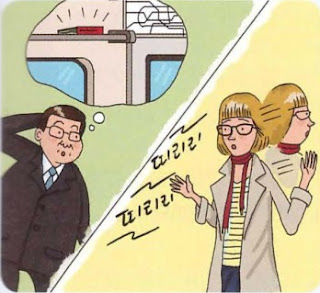가: 세린느 씨 남편은 아주 꼼꼼하고 침착하신 것 같아요.
Celine, your husband seems really meticulous and composed.
나: 말도 마세요. 그렇게 보여도 어찌나 덜렁대는지 자꾸 물건을 어디에 놓고 오기 일쑤예요. 지난달만 해도 똑같은 책을 세 권이나 샀다니까요.
You don’t know the half of it. He may appear that way, but he’s actually really careless and always leaves things everywhere. Just last month, he bought the same book three times.
가: 어머, 그래요? 오히려 세린느 씨가 그럴 것 같은 데…”.
Oh, really? But you seem to be the one who’s more like that…
나: 호호호. 사실 저도 휴대 전화를 어디에 놓았는지 잊어버려서 벨이 울릴 때마다 찾기 일쑤예요. 부부는 닮는 다고 하잖아요.
Ha-ha. Actually, I often forget where I left my mobile phone and always have to find it when it rings. Don’t they say that married couples become similar?
This expression is used to indicate that something occurs often or regularly happens. It is mainly used in a negative sense to express that an undesirable action occurs repeatedly. A variety of forms are used, including -기가 일쑤이다, -기 일쑤다 and -기가 일쑤다. It only attaches to verbs.
• 날마다 늦잠을 자는 데다가 밥맛도 없어서 아침을 거르기 일쑤이다.
I always sleep late and don’t have an appetite (in the morning), so I always just skip breakfast.
• 놀이공원과 같이 사람들이 많은 곳에서는 아이를 잃어버 리기 일쑤예요.
It’s common to lose one’s kids at places where there are a lot of people, such as amusement parks.
• 회사 창업 초기에는 일이 많아서 밤을 새우기가 일쑤였지만 꿈이 있어서 힘든 줄 몰랐다.
When we started the company, we habitually stayed up all night because we had a lot of work to do, but we were running on our dreams, so we didn’t feel tired.
This expression contains a negative nuance, so it sounds awkward when used in positive situations.
• 그 친구는 무슨 일이든지 열심히 해서 칭찬받기 일쑤다. (X)
ᅳ> 그 친구는 무슨 일이든지 열심히 해서 칭찬을 자주 받는다. (〇)
>> You can click on the title of each grammar below to see other grammars which also express ‘Habits and Attitude’
2. -기 일쑤이다
3. -는둥 마는 둥 하다
>> Full of ‘Korean grammar in use – Advanced’: Click here
>> Full of ‘Korean grammar in use – Intermediate’: Click here

